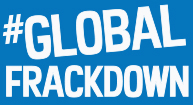
It’s a claim that has been repeated again and again, always without a shred of evidence. Former NATO Secretary-General Rasmussen said that Russia is infiltrating environmental organisations working against shale gas to maintain European dependence on imported Russian gas. Some so-called experts have described European groups that campaign for a ban on fracking as “[w]ell-organized and well-funded”, even claiming that anti-fracking groups were able to pay for advertising campaigns with billboards to spread their message. Our reply has always been that extraordinary claims require extraordinary evidence – for example, evidence of an exchange of views between Gazprom officials, Russian diplomats and our supporters.
Meanwhile, on the website of the Brussels Energy Club, you can find an attendance list for a November 2014 meeting where Gazprom lobbyists and Russian diplomats sat down with … environmentalists? No – oil and gas lobbyists.
American super-oil-major ExxonMobil is listed, but also major European companies like Statoil, BP, Total and Eni. The lobby for the upstream oil and gas sector IOGP – International Association of Oil & Gas Producers – is also listed. And the consultancy FTI Consulting (the group behind the PR effort ‘Shale Gas Europe’) is there as well. So is a representative from another consultancy, Fleischman Hillard, which organizes the yearly ‘Gas Naturally’ week in the European Parliament. Even a representative of the Polish Permanent Representation to the EU showed up. Poland has been mobilized to promote a shale gas hype in Europe and lobby against any regulations on fracking.
What if critics of shale gas had sat down with Gazprom lobbyists? It would be presented as overwhelming evidence that anti-fracking groups have a direct ‘hot line’ to the Kremlin. All evidence to the contrary would be dismissed as smoke and mirrors.
What conclusions can we draw from this? It is clear that both Gazprom, Russia and American and European Big Oil & Gas all share the same interest: Keeping the European Union hooked on gas. They may come from different parts of the world, but they share the same marketplace. And oil and gas companies from Russia, the United States, France and Norway prefer a growing market over a shrinking one. This is why they are lobbying against ambitious plans for renewables and funding to adapt the European grid to a high share of renewables (with smart grids, demand response, energy storage, etc.). And they were successful: The European Union set a totally inadequate 2030 target of a 27% share for renewables in the EU’s energy mix. The gas industry is also happy to see only a non-binding weak target for energy efficiency. Why? They run scared that Europeans may start to go for ‘deep renovations’ in their houses, drastically reducing the demand for natural gas in the heating sector.
All this reminds me of this quote about money from the popular TV series ‘Family Guy’: “It doesn’t matter if you’re black or white… the only color that really matters is green”. Whether it’s Exxon, Statoil or Gazprom, the industry just wants to keep selling their favourite fossil fuel – gas – and preferably a lot of it.
Yet another reason to keep up our campaign for a ban on fracking. Later this year, Food & Water Europe will again organise the Global Frackdown, an international day of action against fracking. In 2015, the year of the Paris climate summit, we will again call on our political leaders to ban fracking and keeping fossil fuels in the ground to have a chance of avoiding runaway climate change. Stay tuned!


